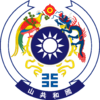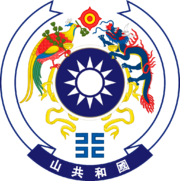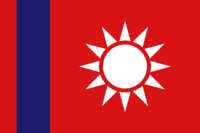Monsilvan nationality law
| Monsilvan Nationality and Citizenship Act, 1942 | |
|---|---|
| Parliament of Monsilva | |
| Territorial extent | Monsilva |
| Passed by | Parliament of Monsilva |
| Passed | 27 March 1942 |
| Assented to by | Qing Emperor |
| Assented to | 4 May 1942 |
| Effective | 11 May 1942 |
| Legislative history | |
| Bill title | Monsilvan Nationality and Citizenship Bill, 1941 |
| Introduced by | Han Longwei, Secretary of State for the Interior |
| First reading | 21 March 1941 |
| Second reading | 12 September 1941 |
| Third reading | 7 November 1941 |
| Amended by | |
| 9 February 1979 (amending the whole law) 20 October 2017 (last amended) | |
| Summary | |
| An act to make provision for the acquisition and loss of Monsilvan nationality and citizenship. | |
| Status: Amended | |
| This article is part of a series on the |
| Politics of Monsilva |
|---|
 |
The primary law governing nationality of Monsilva is the Monsilvan Nationality and Citizenship Act, 1942 (Monsilvan: 1942年山国国籍及公民权法; pinyin: 1942 nián shānguó guójí jí gōngmínquán fǎ), which came into force on 11 May 1942. This act has since been amended several times, with the most significant amendment being on 9 February 1979, just under two months after the Kingdom of Monsilva was dissolved in favor of the Monsilvan Republic. The act was last amended on 20 October 2017. As a member of the Ostlandet Union (OU) and the Regional Organization of the Kivu Ocean (ROKO), Monsilva grants increased movement rights to nationals of certain member countries, which are outlined by Monsilvan settled status laws.
Monsilvan nationality is based on the principle of jus sanguinis, children born to at least one Monsilvan parent are automatically nationals at birth. Foreign nationals with permanent residency in Monsilva may naturalize after continuously living in the country for at least 5 years. Certain foreign immediate family members of Monsilvan nationals may naturalize after continuously living in the country for at least 3 years. Persons born on Shaoyu Island either during the Jackian administration of Niao Dao or during the Zloveshchiyan administration of Akvatika, are entitled to – but not automatically granted – Monsilvan citizenship, unless they were still a resident on the island after 30 September 2023.
Since July 1980, dual citizenship is permitted without restriction.
Contents
History
Acquisition and loss of citizenship
Entitlement by birth, descent, or adoption
Persons born in the Monsilvan Republic are entitled to but not automatically granted citizenship if at least one parent is a Monsilvan citizen, holds an entitlement to a Monsilvan citizenship, is a resident with no time limit to stay in Monsilva or is a resident who has been domiciled in Monsilva for at least five years (unless they reside with a Monsilvan citizen, whereby they only need to have been domiciled in Monsilva for at least three years). Any person entitled to Monsilvan citizenship who performs an act that only a Monsilvan citizen has a right to do, such as applying for a Monsilvan passport or registering to vote in national elections, automatically becomes a citizen. The only other way for a person to automatically become a Monsilvan citizen is to be born in Monsilva and not be entitled to any other country's citizenship.
Children born overseas are Monsilvan citizens by descent if either parent or any grandparent was born in Monsilva and is either a Monsilvan citizen or entitled to be one, while those born to a Monsilvan parent who was also born overseas are only entitled to Monsilvan citizenship if their birth is registered at a Monsilvan diplomatic mission or the parent was resident abroad while in public service.
Adopted children are automatically granted Monsilvan citizenship if the adoption is completed in Monsilva; parents adopting children overseas must register an adoption with the Monsilvan authorities for the process to take effect in Monsilvan law and are required to apply for immigration clearance before any adopted children may enter the country as citizens. Abandoned children found in Monsilva with unclear parentage are considered to have been born in Monsilva to at least one Monsilvan parent.
Shaoyu Island
Individuals born on Shaoyu Island before 1 November 1969, when it was under the Jackian administration of Niao Dao, are entitled to Monsilvan citizenship regardless of their parents' nationalities.
Similarly, individuals born on Shaoyu Island between 1 November 1969 and 30 September 2023, but did not reside in Monsilva or on the island for 30 days or more at any point between 21 June 2023 and 27 January 2024, are entitled to Monsilvan citizenship if they and neither of their parents were affiliated with the Zloveshchiyan government or armed forces and if at least one of their parents are Monsilvan, Jackian or Zloveshchiyan citizens.
Individuals born on Shaoyu Island between 1 November 1969 and 30 September 2023 who did reside in Monsilva or on the island for 30 days or more at any point between 21 June 2023 and 27 January 2024, are entitled to Monsilvan citizenship if they and both of their parents were not affiliated with the Zloveshchiyan government or armed forces, regardless of their parents' nationalities.
Individuals born on Shaoyu Island after 27 January 2024 follow the same citizenship laws as the rest of Monsilva.
Naturalization
Foreigners over the age of 18 as well as minors born in Monsilva may naturalize as Monsilvan citizens after residing in the country for at least five of the previous nine years, with one year of continuous residence immediately preceding an application and demonstrating proficiency in Monsilvan or Shaoyunese (only if they reside in Shaoyu). For applications married to or in civil partnership with Monsilvan citizens, the residence requirement is reduced to three of the last five years. Candidates must satisfy a good character requirement and intend to remain domiciled in Monsilva after naturalizing. Individuals under investigation by local police are routinely denied naturalization. The Secretary of State for the Interior has discretionary power to waive any or all citizenship requirements for applicants of Monsilvan descent or association, minor children of naturalized citizens, individuals in public service stationed overseas, or recognized refugees and stateless persons.
Loss and resumption
Monsilvan citizenship can be relinquished by making a declaration of renunciation, provided that the declarant ordinarily resides overseas and already possesses or in the process of obtaining another nationality. Renunciations cannot be made during wartime unless exceptionally approved by the Department of the Interior. Former citizens who were born in Monsilva may subsequently apply to reacquire citizenship. Previously naturalized individuals or those who had acquired citizenship by descent do not have a direct path to citizenship restoration and must complete the naturalization process to regain Monsilvan citizenship.
Citizenship may be involuntarily removed from naturalized persons who fraudulently acquired the status, willfully perform an overt act that constitutes a breach of loyalty to the state, holds citizenship of a country at war with Monsilva, or has voluntarily acquired another citizenship by any method except through marriage or civil partnership. Naturalized persons, other than those of Monsilvan descent or employed in the civil service, who reside outside Monsilva for a continuous period of seven years without annually registering their intention to retain Monsilvan citizenship may be stripped of their citizenship.
Travel freedom of Monsilvan citizens
Visa requirements for Monsilvan citizens are administrative entry restrictions by the authorities of other states placed on citizens of Monsilva. As of April 2024, Monsilvan citizens had visa-free or visa on arrival access to TBD countries and territories.

